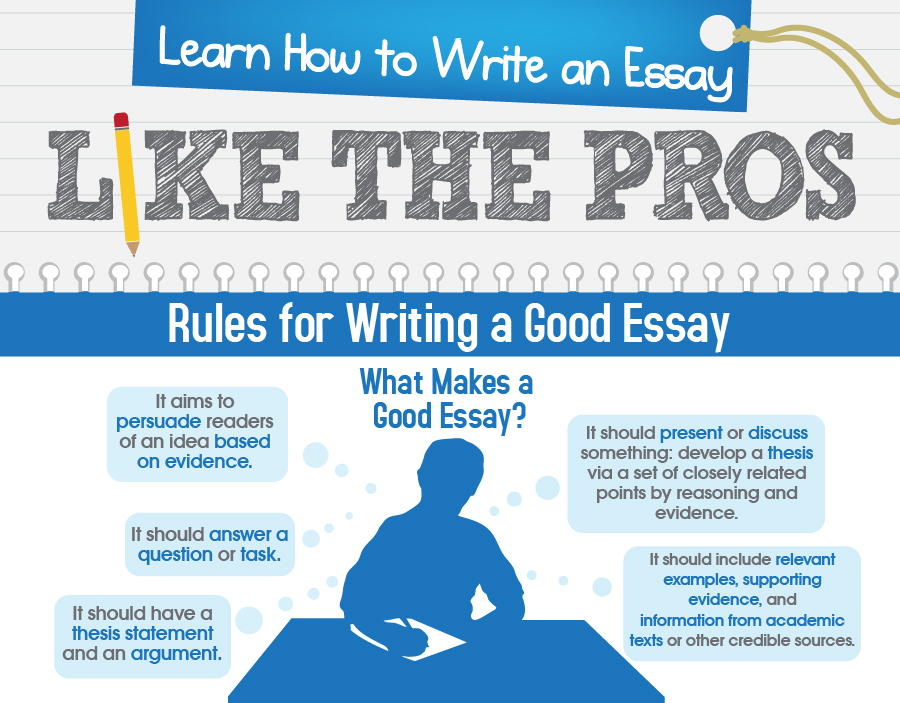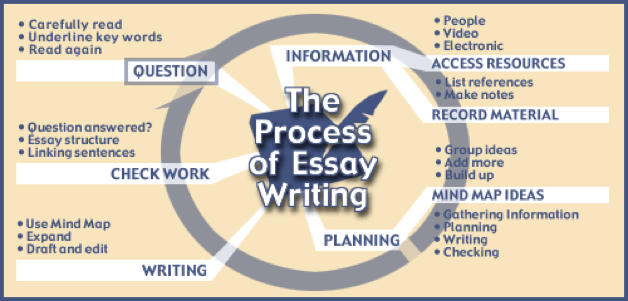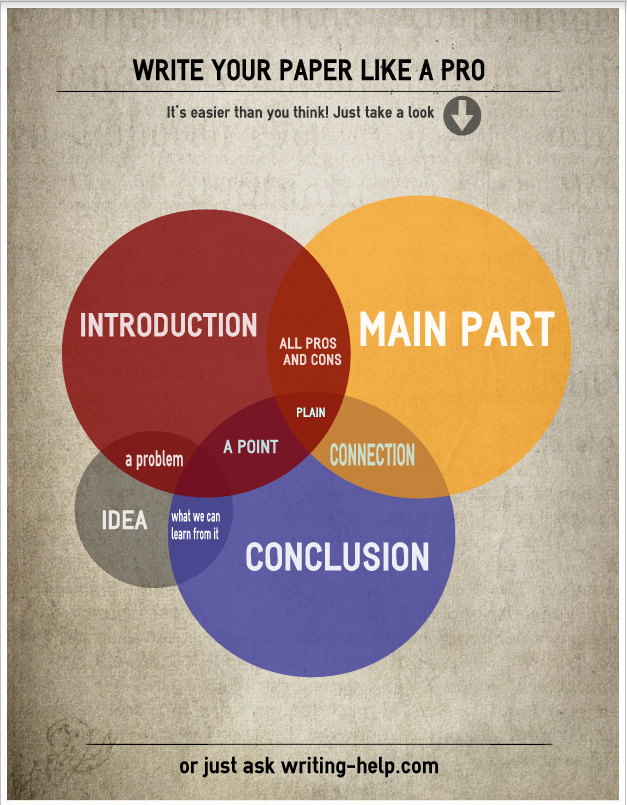Essays are probably the most common task you are going to encounter in your academic career. They often come up as class and homework assignments in middle and high school and are always used as a part of college admission process: you are going to write them throughout college and, depending on the career you choose, – as a part of your academic work.
What we are getting at is this – if you learn how to write essays properly early on, you are going to save yourself a great deal of time, effort and nerve cells.

Source: http://waveavenue.com/wp-content/uploads/2014/03/essay-writing.jpg
Choosing the Topic for Your Essay
The first step of writing an essay is, naturally, deciding what you are going to write about. Unfortunately, you are not always given this opportunity; nevertheless, even when the topic is predetermined, it is often possible to nudge it a little bit in a more desired direction without making it look too far-fetched.
If you are given a free reign in this matter, it is at the same time easier and much harder. Easier because you can choose the topic that would ideally fit you; harder because the agony of choosing can be really painful and paralyzing than even the least interesting topic. So, what are the best options you have?
- Something you are genuinely interested about. It is the best possible approach – when your involvement with the subject goes way beyond the school curriculum, it, on the one hand, makes writing much easier and more enjoyable and, on the other hand, does wonders for the quality of the final product.
- Something you know well. You may not be particularly interested in the topic but, for some reason, know a lot about it. You won’t have to dive into textbooks for every other sentence but will have your own opinion on the subject from the get-go – it’s a great chance to show off your knowledge.
- Something you can consult somebody about. If you know somebody who can and will give you some first-hand knowledge of the subject – go for it. For example, if you have to write about the challenges of healthcare system and have a relative who is a doctor, he/she may provide you with invaluable information on the subject.
Preparation
Many beginners tend to downplay or outright omit this stage. It is true, when the deadline is looming close and there is a lot of work to do, it is terribly tempting to just cut to the chase and conserve time and effort.
In reality, however, the result will often be diametrically opposite – you will spend hours writing, crossing out, rewriting, suddenly remembering that you’ve forgotten to mention something at the start and now have to restructure the entire thing for it to ever make any sense. Therefore – preparation is crucial and should constitute the majority of your work on an essay, like here:

Depending on how much time you have, preparation may include the following stages:
- Early start. The earlier you start thinking about the topic of your essay, even prior to actual research and information gathering, the higher is the possibility of you stumbling on some useful fact or another in an unexpected place: on TV, in a conversation, etc.
- Asset evaluation. Jot down everything you know about the topic. Mark the areas where you need additional data. Remember all the competent people you can consult on the topic.
- Prepare the set of questions you need answered. This will make search for information much easier.
- Information gathering. Look for relevant information in all available sources: libraries, the Internet, among your acquaintances and so on. Keep notes and don’t overdo things – when you feel you know enough, it is enough. Also, make sure you record all your sources.
- Formulate your thesis statement. What is the main point you want to make? Select one to three most important ideas supporting your topic and make sure you have facts, statistics or logical proof to back them up. In other words, thesis statement is a short summary of what you are going to talk about in the essay and why.
- Plan your essay. Write down, in short, what you are going to write about in each part of your essay – we will talk more about it when describing specific parts of the essay.
Source: https://www.youtube.com/watch?v=p1KbANXoWlo
Writing an Introduction
In the most basic terms, every essay consists of three parts: introduction, body and conclusion. Of these three, the writers usually pay the greatest attention to the body, dealing with both introduction and conclusion in a couple of off-hand sentences. Big mistake!
Source: https://www.youtube.com/watch?v=IN6IOSMviS4
Introduction is as important as the body, probably even more. Its work is to produce the precious first impression on the reader and decide whether he/she is going to be interested in what you have to say from the get-go – or will be prepared to read yet another boring piece of mediocre writing. And although your teacher or professor will probably read it to the end (it’s their job, after all), the first impression might be spoiled. In order to avoid this, you should follow several simple rules:
- Make sure your introduction starts with an attention grabber or ‘hook’. The first sentence should glue the reader’s attention and make him/her want to read on. It may be a shocking statistic or a fact, a controversial or an outrageous statement, a quote – or anything else that would make them want to know what you are going to say next.
- Don’t forget to state the main idea or thesis of your essay, preferably as the last sentence of the introduction.
- Be sure to logically connect the ‘hook’ to the thesis and the thesis to the body of the essay.
- Avoid fillers. It is a good rule to remember in general, but doubly so in introduction – it should be short and snappy.
- Avoid generalizations and clichés. There is nothing more depressing than reading yet another essay starting with “Few people know”, “Since the beginning of time” or something equally bland.
Body Paragraphs: Structure
Body is the meat of the essay – it is where you express all your thoughts and try to prove your point to the reader. However, it doesn’t mean that you should simply pile everything together and leave the reader to make some kind of sense of it. First and foremost, the body should be properly organized.
In most cases, one paragraph equals one point. Thus, each paragraph is dedicated to a particular point you’ve selected during the preparation phase: you introduce it, follow it up with some supporting evidence, answer possible counter-arguments if necessary, and conclude the paragraph with a logical bridge that connects it with the next point, covered in another paragraph.
If a point is too big to be expressed in a reasonably-sized paragraph, divide it into several sub-points– just make sure each of them constitutes a fairly independent logical unit properly connected with the rest of the body.
Body Paragraphs: How to Write
But what, exactly, does one write in body paragraphs? It is hugely dependent on the essay type, but there are some guidelines that are more or less universal.
- Be specific. Depending on the essay type, you may be expected to bring up factual evidence, statistics or logical conclusions. Irrespectively of an essay type, however, you should avoid one and the same thing: vague generalities not supported by evidence.
Source: https://www.youtube.com/watch?v=lfVQjLFidjE
- Avoid using personal pronouns unless it is specifically stated in requirements (recounting a personal experience without ever using “I” may be awkward).
- If you cannot support an idea with evidence, don’t use it at all. When using a source, always credit it and make sure you do it according to the accepted citation format.
- Don’t ‘forget’ to mention facts that seem to disprove or challenge your claims. This trick will be obvious for anybody more or less familiar with the topic in question and is only going to present you in unfavorable light.
- Make sure to properly connect one paragraph to another. Words like but, however, despite, for example, therefore, as a result, thus, similarly, moreover and suchlike serve exactly this purpose; more elaborate constructions are also possible.
- Make sure all your points support your main idea and go well with each other. If there is a brilliant point to be made about the topic, but it doesn’t exactly have anything to do with your thesis statement or looks really out of place when compared with other points, it may be better to drop it entirely.
- Don’t use plagiarism – which sort of goes without saying, but still.
Writing a Conclusion
Ironically, it is the conclusion that allows the most freedom, for there are basically no rules that set in stone the way it should be written. Basically you should make sure you drive your point home one last time, and it doesn’t matter how you do it as long as you do it effectively.
However, if you have no ideas for a creative conclusion, you may use one of well-tested techniques:
Source: https://www.youtube.com/watch?v=pvs9IpA5O2s
However, it doesn’t mean that you should simply paraphrase your introduction and leave it at that – it is an incredibly lazy approach that isn’t likely to warrant any positive reactions. There are ways to establish the connection with the starting statement in a much more elegant fashion. For example:
- Use a quotation from one of your sources. Make sure it either amplifies your point or presents it from an unusual angle.
- Use the starting point to move the discussion to another context. For example, if you discuss immigration policy in Great Britain, you may draw parallels or draw attention to its differences with that in the USA.
- Consider the implications of your argument. What do the conclusions you’ve made imply or suggest?
There are innumerable ways to conclude your essay in a creative way – just keep your eyes open and remember that there are no surefire recipes.
General Advice
When all is said and done, however, you should remember that despite learning how to write particular parts of an essay can greatly help your technique, knowing them isn’t the same as knowing how to write essays.
All elements of essay writing are interconnected and cannot be considered in isolation from one another; at any stage of writing you should keep in mind how it influences all the others:

Source: https://graphs.net/wp-content/uploads/2012/08/infographics-3.png
So, here are some points that refer to the process in general:
- Write the essay in any order that sits well with you. However, the most logical method would be to start with the thesis statement, go on to the body and then, judging from how these two have turned out, think about an interesting introduction and conclusion.
- Ideally, you should leave your already written essay for at least a day or two before starting to edit it – in this case you will be able to look at it with fresh perspective and notice all the flaws you would’ve otherwise missed.
- Give the essay to somebody else to read and ask for an objective opinion. A person who doesn’t know the direction in which your thought moved in the process of writing is the best judge of whether your essay is logically sound. What may look perfectly reasonable to you may be incomprehensible for an outsider.
- Even if you are tempted, don’t exceed the word limit. There is always something you can omit without any negative consequences.
- Use mind mapping – this popular technique can help you organize your thoughts and quickly remember what refers to what.
And finally – no matter how many guides and tips on essay writing you read (and even learn by heart), nothing is going to replace good old practice. The best way to write better essays is to write bad essays until they start getting better and better – so close this guide and go write your essay. Now!